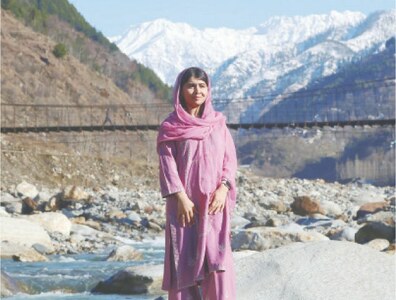
HIS life was a timeless feat — all of 85 years. Lived to the full, Shoaib Hashmi raced through it spreading knowledge and cheer in equal measure. In every role he played — a family man, teacher, mentor, actor, friend — he was only his own match.
A proud and erudite Lahori, he knew just about everyone his age and older, or worth the name. He had a knack for digging up genealogy; he’d instantly figure you out and your family in the first meeting, and drop all formality to put you at ease.
On and off stage, he was the same man that people knew even from a distance. The roles he played had a lot of real him in them, the venue did not matter. Starting out at the Government College Dramatic Club (GCDC), one of South Asia’s oldest theatre groups founded in 1890, which produced a galaxy of actors before and after his generation, Shoaib went on to study theatre at the Royal Academy of Dramatic Arts in London. This was after he had got his master’s in economics from Government College, Lahore and a post-graduate degree from London School of Economics.
Teaching mathematics and economics full time, he equally relished theatre and TV productions — the latter fittingly bordering on the absurdist in a country where the absurd is a euphemism for normal. Shoaib Sahab was a trendsetter in producing comic satire for PTV throughout the 1970s, including Akkar Bakkar, Such Gupp, Taal Matol and Balila. The last mentioned was banned by Ziaul Haq’s regime only after a few episodes were aired.
The team he worked with included friends and students, besides wife Salima Hashmi, followed by Samina Ahmed, Navid Shahzad, Arshad Mahmood, Nayyara Noor, Sheheryar Zaidi, Farooq Qaiser and Salman Shahid, among others. Together they sang, mimed and played puppets to spread cheer through witty, role-playing skits, which would become a whole new genre in TV entertainment in the years that followed.
These pioneering efforts and the immense talent deservedly won him the President’s Pride of Performance and Tamgha-i-Imtiaz. In later years, he recited and translated Faiz’s poetry (into English: Aaj ke naam, 2010), lectured on history and culture; he also designed and taught a course at Lahore School of Economics.
All this without losing humour, especially if he spotted you in town and you hadn’t been in to say hello: waving his stick, he could chase you in the Model Town Park; or at an eatery, he could scold you for coming to town to having eaten everything good, leaving nothing for him. Back in the classroom, he would roar like a lion often asking those not present to stand up so he knew who had bunked class! No one ever did.
On the GCDC stage he would be coaxed into directing, showing each and every move himself; teaching how to deliver the lines never looking away from the audience, how to walk diagonally and never in a straight line — the bare basics of stage.
Whilst at it he would rub in theatre traditions and manners, i.e. never to use real flowers on stage or run down a fellow group’s performance but to always concentrate on honing your own skills. This was mentoring, taking the youngsters through the ropes, parenting in effect. Then there was a generous reward for a good day on stage. He would take away Chinese to feast the whole team at his place; there was never a dry fare.
From earlier on, celebrity was their housemaid. The son-in-law of Faiz Ahmed Faiz and Alys and the husband of Salima Hashmi, artist and teacher, meant that their house remained abuzz with activity. Frequented by master crooners like Noor Jehan, Farida Khanum, Iqbal Bano, Shaukat Ali and Nayyara Noor, who would literally sit at Faiz’s feet and sing his poetry to him, it was a rendezvous for celebrities, intellectuals, poets, scholars and students alike.
Even though Faiz and Alys lived in their own house a few blocks away, it was the Hashmis’ house that invariably was the meeting point for Faiz Sahab’s elders and contemporaries like Ustad Daman and Sufi Tabassum, to name but two. The tradition continued for years after Faiz’s passing because of the hosts’ unlimited generosity; for many culture buffs, theirs is a must-go destination for the sheer richness of its occupants and their celebrity visitors.
Shoaib Sahab can rest assured that the inimitable Salima, son Yasser and daughter Mira are the proud custodians of this enduring tradition.
Published in Dawn, May 16th, 2023














































